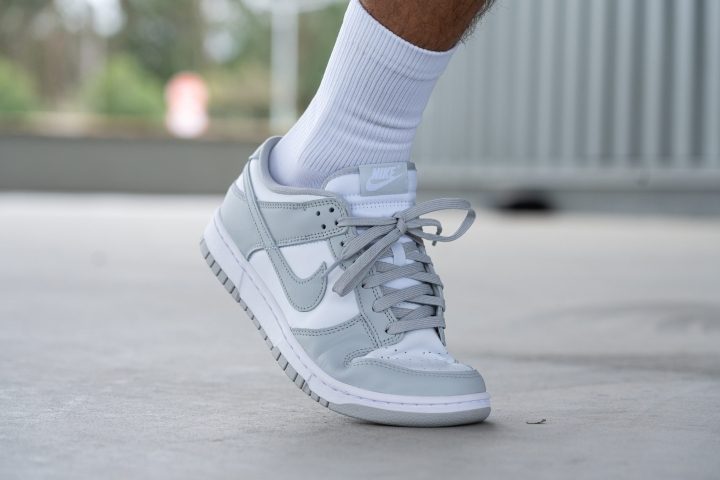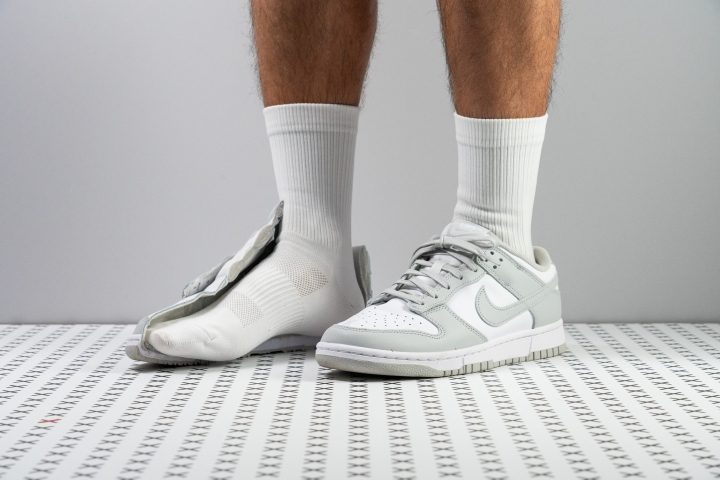Our verdict
- Our top pick in best Nike sneakers
Pros
- Retro basketball aesthetics
- Real leather (suede) upper
- Excellent durability for the price
- Low and grounded platform (loved by skaters)
- Very stable and supportive
- Surprisingly flexible in the forefoot
- True to size and fit
- Extra eyelets
Cons
- Needs breaking in
- Firm and rigid sole
- Not for all-day wear
Audience verdict
- Top 12% most popular sneakers
Comparison
The most similar sneakers compared
Who should buy
We believe that the Nike Dunk Low deserves a spot in your sneaker stack if:
- you appreciate basketball-inspired retro sneakers with the '80s vibe
- you can't resist the iconic Nike sneaker designed by Peter Moore
- you want to complete a clean look with a real leather/suede sneaker
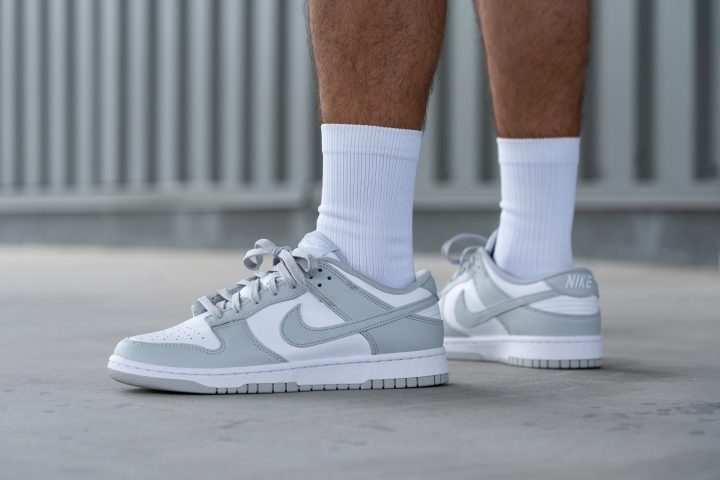
Who should NOT buy
Its rigidity and lack of cushioning make the Nike Dunk Low a poor choice for all-day wear. If you want to feel comfortable and supported for hours on end, we recommend the ASICS EX89.
You might as well consider the Nike Air Max 1 as it feels a bit softer and lighter on the foot.
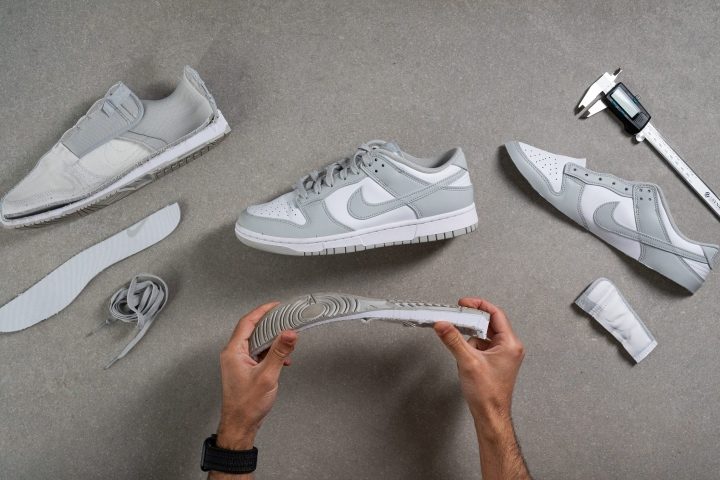
Breathability
For an all-leather sneaker, we were surprised to feel the airflow inside the Nike Dunk Low!
At first, we thought that the sneaker was ventilated through the toebox perforations. But as our smoke-pumping test revealed, most of the heat escaped through the gaps in the tongue area.
The perforations don't seem to help breathability as much. They are not very large and are lined with textiles from the inside.
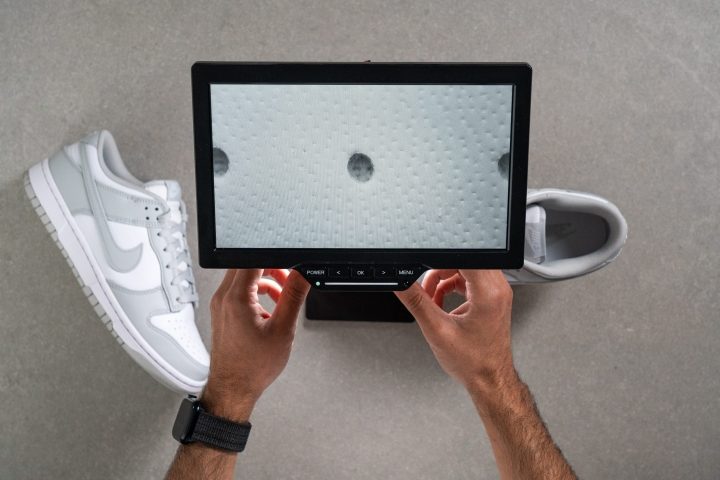
All things considered, we gave the Dunk Low a moderate breathability score of 3. It is not ideal for a hot summer day but is just right for slightly cooler temperatures below 77°F (25°C).
| Dunk Low | 3 |
| Average | 3.1 |
Durability
Leather/Suede quality
The Dunk Low is one of Nike's classic silhouettes featuring premium leather or suede uppers. We are here to test the quality of the leather variant.
As usual, the brand didn't disappoint. Using a butane torch and a leather scratch awl, we made sure that the sneaker was indeed made of real leather.
We tested the primary upper panels, the Swoosh, and the top overlays - all proved to be genuine. No melting.
| Dunk Low | Real leather |
Toebox durability
A robust leather upper contributes to the lifespan of the Dunk Low.
It was one of the reasons why the silhouette became so popular with the skateboarding community in the late '90s. Hard-wearing leather (or suede) with thick overlays on the sides stood up to the aggressive wear and tear of skateboarding.
We didn't get a chance to test this Nike sneaker's durability on a board but we did have a Dremel with a sandpaper tip close by.
After 12 seconds of drilling the shoe's toebox at 5K RPM speed, we really liked what we saw.
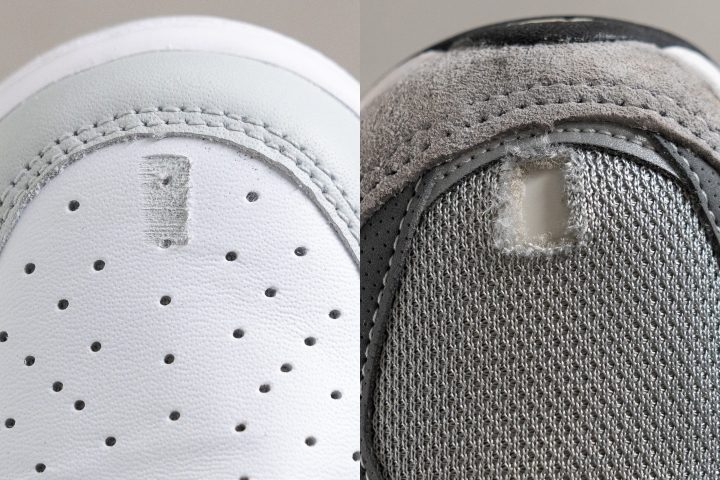
Nike Dunk Low vs. New Balance 990 v3
The tool left a minor scuff without affecting the sneaker's integrity. Comparing it to other kicks in our lab, we gave it a solid 4 out of 5 for toebox durability.
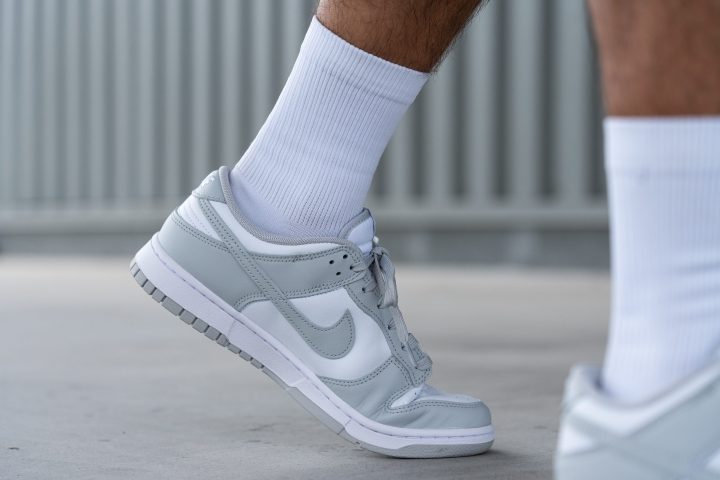
Our only gripe with this part of the Dunk Low is that it creases a bit more than other silhouettes. It is more of a cosmetic issue though.
| Dunk Low | 4 |
| Average | 3.6 |
Heel padding durability
The shoe's inner lining is not so frail either. We wouldn't worry about it tearing so easily.
As our 4-second Dremel test shows, the mesh lining inside the heel counter can handle the abrasion better than the average sneaker.
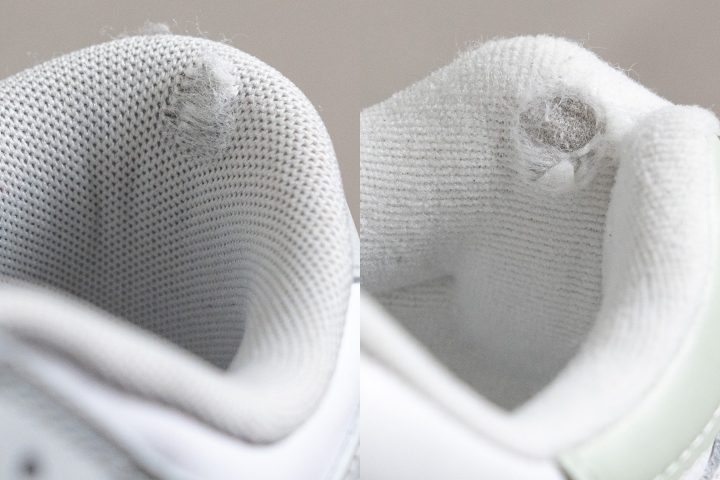
On a 1-5 scale, where 5 is the most durable, we rated the shoe's heel padding with 4.
| Dunk Low | 4 |
| Average | 3.3 |
Outsole hardness
Stemming from basketball shoes, it is no surprise that the Nike Dunk Low comes with a very hard rubber outsole.
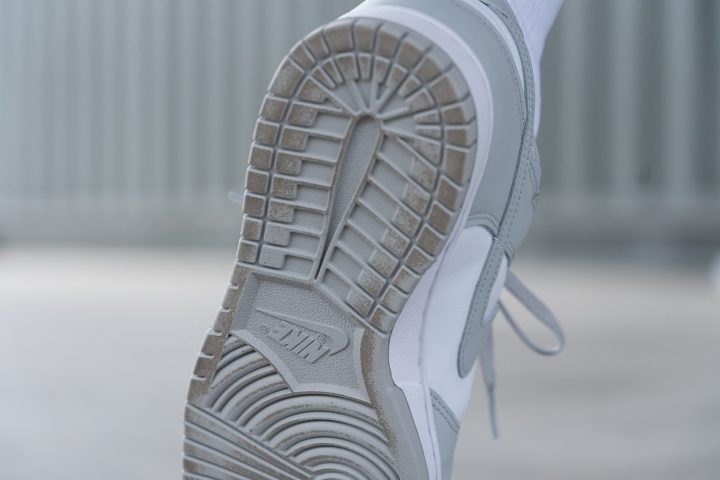
Measuring it with an HC durometer, we got a reading of 90.3. It is harder than 92% of our lab-tested sneaker outsoles.
Even though hard rubber makes the shoe feel firmer underfoot, it's hard to beat when it comes to durability.
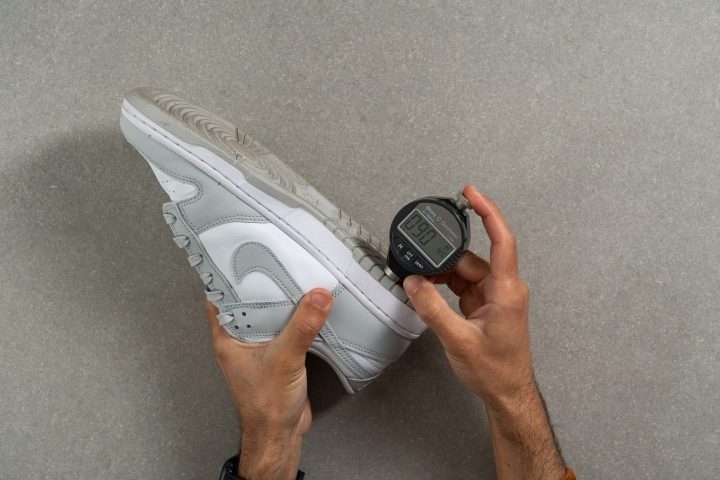
| Dunk Low | 90.3 HC |
| Average | 85.2 HC |
Outsole durability
Setting our Dremel speed high (10K RPM), we drilled the shoe's rubber relentlessly for 22 seconds.
Even though the Dunk Low hasn't outperformed other sneakers, it still showed great results! Measuring the depth of the damage with a tread gauge, we got 1.0 mm which is the same as the average among sneakers.
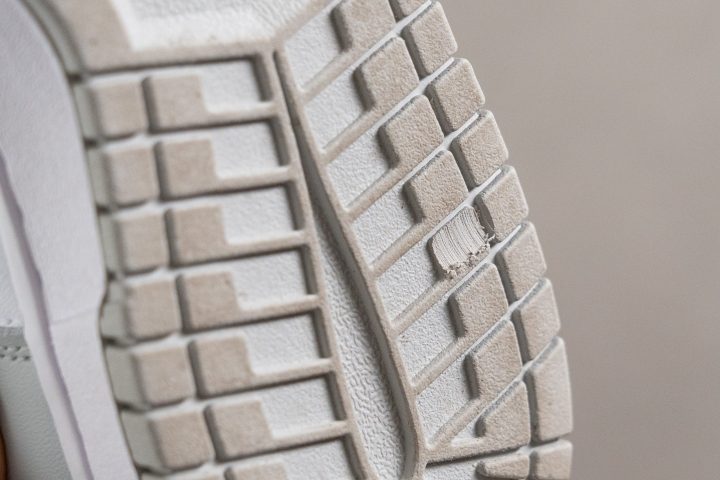
| Dunk Low | 1.0 mm |
| Average | 1.0 mm |
Outsole thickness
It will most likely take you the same time and effort to wear through the Dunk Low's outsole as it takes in similar kicks (which is more than one season, for sure!).
Measuring its outsole thickness with a caliper, we got a standard 5.7 mm of rubber.
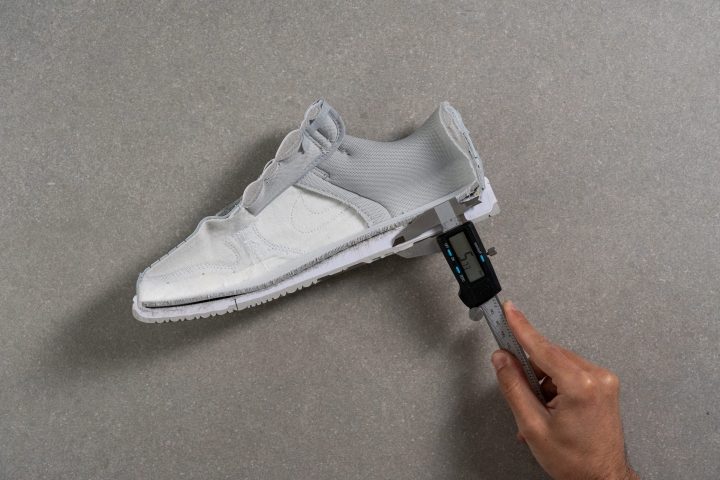
| Dunk Low | 5.7 mm |
| Average | 5.5 mm |
Weight
Its sturdy leather upper and substantial cup sole make the Nike Dunk Low a bit more heavy-set than the average sneaker.
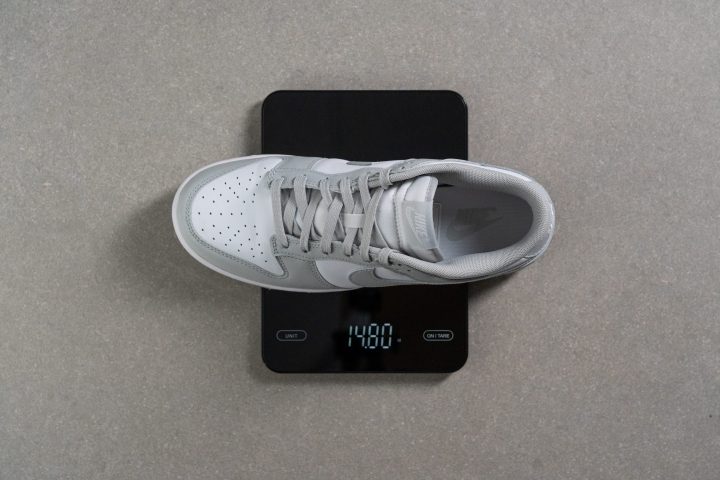
Weighing it in a men's US size 9, we got 14.8 oz (420g) per shoe. It is lighter than the Nike Air Force 1 07 but a little heavier than the Nike Air Max 1.
| Nike Air Max 1 | 13.4 oz | 378g |
| Nike Dunk Low | 14.8 oz | 420g |
| Nike Air Force 1 07 | 16.4 oz | 465g |
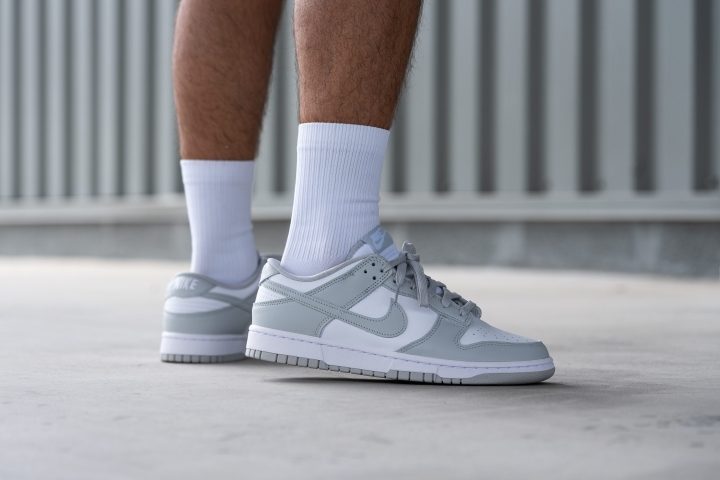
| Dunk Low | 14.82 oz (420g) |
| Average | 14.07 oz (399g) |
Cushioning
Heel stack
The Nike Dunk Low is a very grounded low-profile sneaker. No wonder it became so popular for skateboarding!
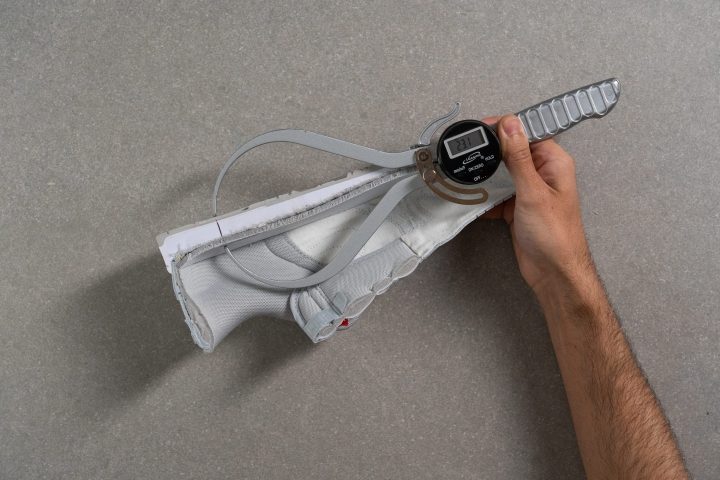
With a heel stack of only 23.1 mm, this kick is over 8 mm lower than average. It is also notably lower than the Air Force 1 07 (a kick it's often compared to).
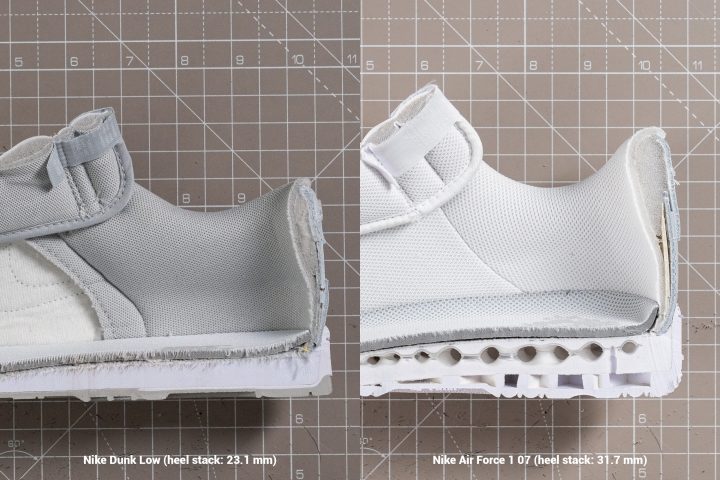
| Dunk Low | 23.1 mm |
| Average | 31.1 mm |
Forefoot stack
The Dunk Low also feels very close to the ground in the forefoot. Based on our caliper measurements, its forefoot stack is only 15.5 mm.
It made the balls of our feet quite sensitive to stepping on rocks and other sharp objects.
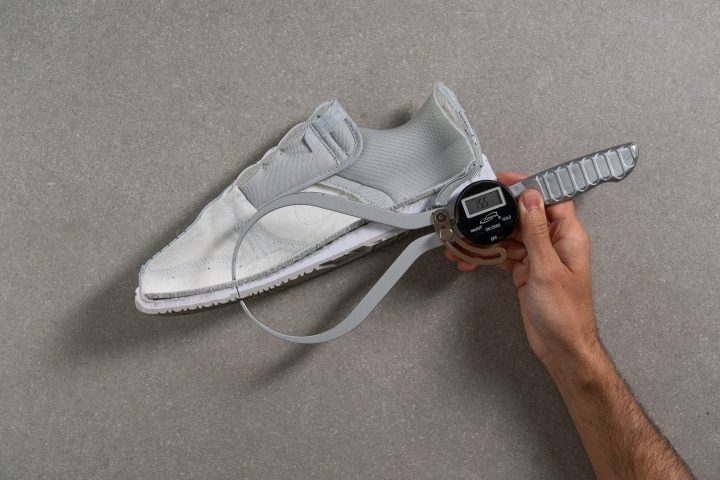
| Dunk Low | 15.5 mm |
| Average | 19.9 mm |
Drop
The lower difference in stack height between the heel and the forefoot also contributes to the Dunk Low's grounded profile.
We measured the shoe's drop at 7.6 mm which is lower than the average for sneakers. Normally, the heel is a bit more elevated in casual sneakers which gives added support to the heels and the Achilles.
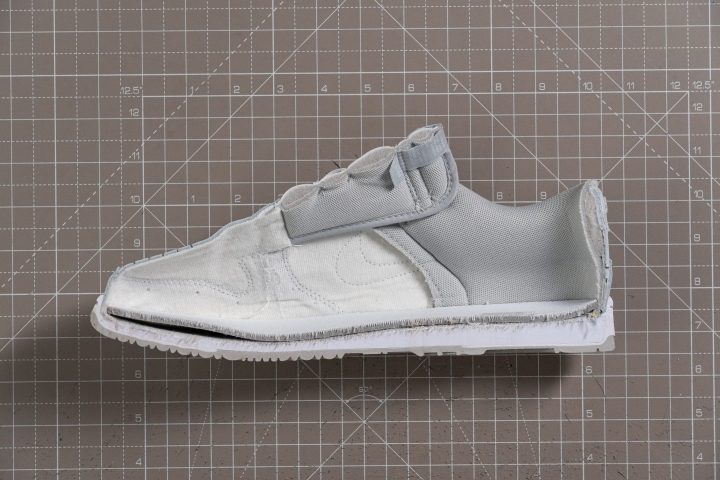
| Dunk Low | 7.6 mm |
| Average | 11.1 mm |
Midsole softness
If you want a sneaker that feels like walking on clouds or pillows, the Nike Dunk Low is NOT for you. The platform of this sneaker is quite firm and unforgiving.
Pressing our durometer against the shoe's half-cut midsole, we got 32.0 HA. It's not much firmer than the average sneaker but is notably harder than the Nike Air Force 1 07 (by 35%!).
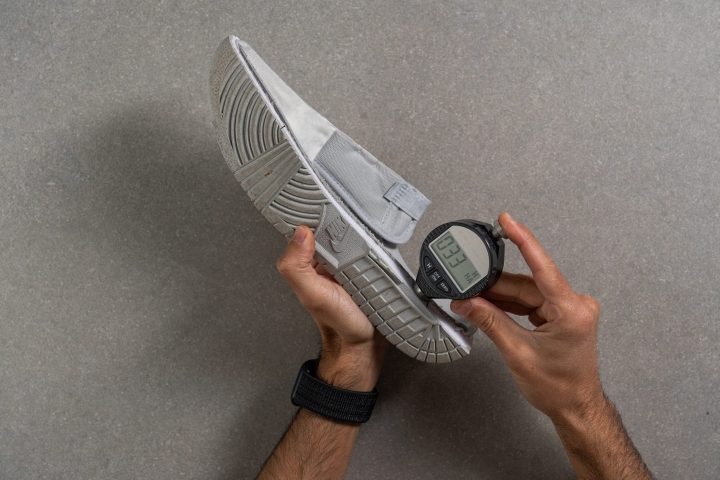
Because of the Dunk Low's firmness and lack of shock absorption, we cannot recommend it for all-day wear. After walking for about 5 hours in this Nike shoe, our feet were begging for a massage.
| Dunk Low | 32.0 HA |
| Average | 30.9 HA |
Insole thickness
The insole inside the Dunk Low doesn't help the shoe's cushioning as much. We measured its thickness at only 3.7 mm which is less than the average.
Overall, cushioning is not this Nike Dunk Low's forte.
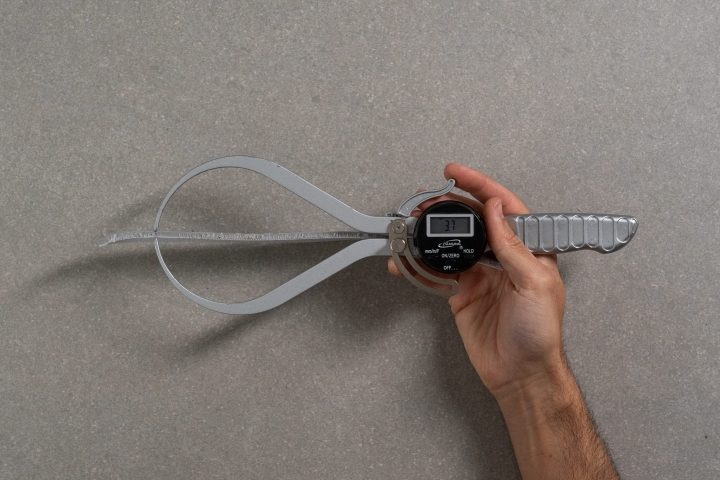
| Dunk Low | 3.7 mm |
| Average | 5.3 mm |
Stability
Lateral stability test
But there is a bright side to the Dunk's sturdy midsole - it provides an amazingly stable platform!
In addition to being firm, the sneaker's stitched cupsole construction makes it feel more supportive too. In this setup, the upper is connected to the sole with 360-degree stitching. As a result, the foot ends up sitting inside the cupsole.
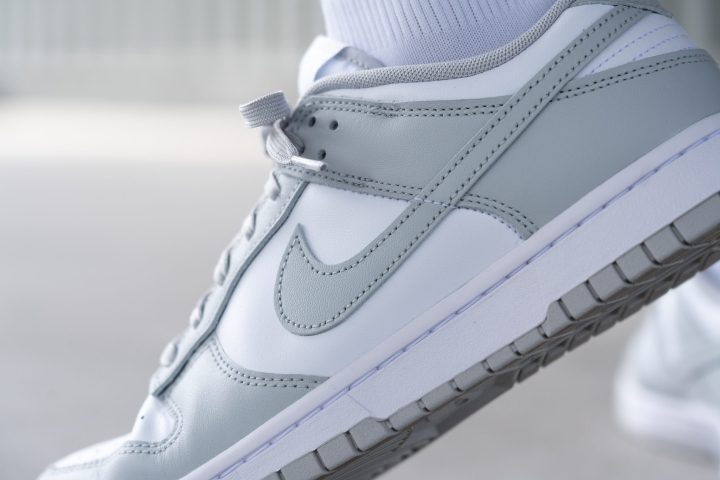
We think that even folks with flat feet and moderate overpronation will find enough stability in the Nike Dunk Low.
Torsional rigidity
A combination of its firm midsole, cupsole design, and hard rubber makes it nearly impossible to twist the Nike Dunk Low.
As our manual test shows, the torsional rigidity of this Nike sneaker deserves a high stiffness score of 4 out of 5.
You can rest assured that this kick won't let you roll the ankle so easily.
| Dunk Low | 4 |
| Average | 3.5 |
Heel counter stiffness
The Dunk Low has a moderately stiff heel counter.
We found that it has a little give to it but not enough to let the heel and ankles shift around or slip out of the shoe.
On a 1-5 scale, where 5 is the stiffest heel counter possible, we rated the Dunk Low with an average score (3 out of 5).
If you prefer a more secure wrap around the ankle, why not consider the Nike Dunk High?
| Dunk Low | 3 |
| Average | 3.3 |
Midsole width in the forefoot
Unlike many oversized kicks that are popular today, the Nike Dunk Low keeps its platform reasonably wide.
Measuring the widest part of the Dunk Low's forefoot, our caliper showed 104.3 mm. It is a few millimeters narrower than the average sneaker. It is nearly identical to that of the Air Force 1 07 (104.0 mm).
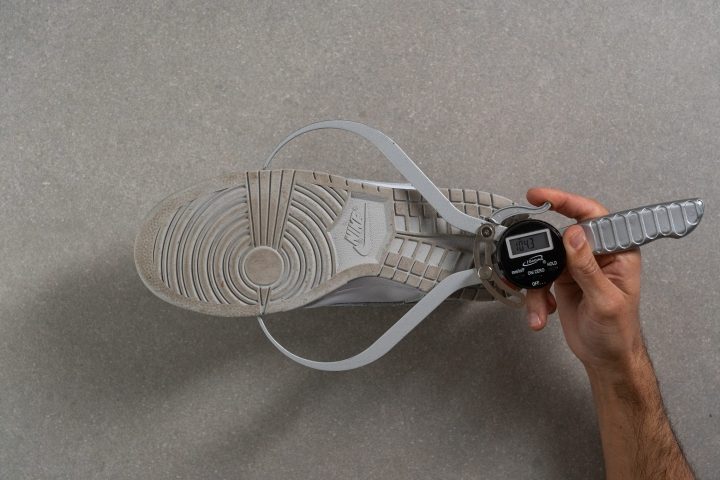
| Dunk Low | 104.3 mm |
| Average | 108.8 mm |
Midsole width in the heel
Checking the widest part of the Dunk Low's platform in the heel, our caliper returned 80.9 mm.
Even though it is a couple of millimeters narrower than average, it was not enough to make us feel wobbly or unstable in this sneaker.
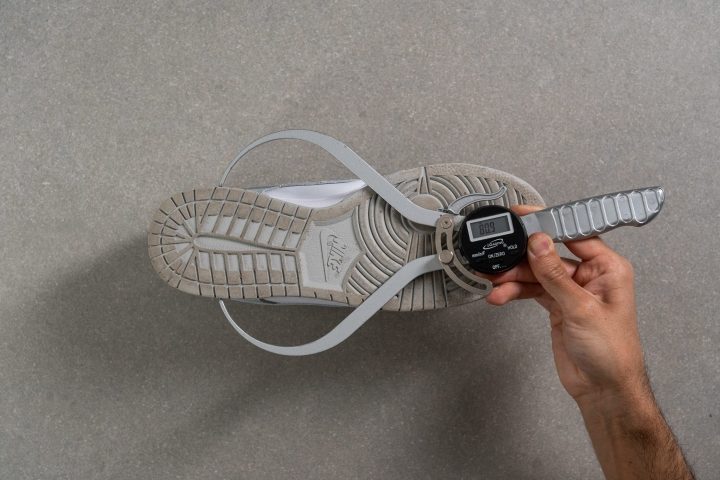
| Dunk Low | 80.9 mm |
| Average | 83.4 mm |
Flexibility
Stiffness
When we first got our hands on the Dunk Low, we honestly thought that it was going very impliable.
But to our surprise, this Nike sneaker offered just enough give in the forefoot to let our feet bend.
Measuring how much force it would take to bend the Dunk Low to a 90-degree angle, our gauge showed 22.2N. That's just about the same as the average of sneakers. And it relaxes even more after a few break-in walks.
Actually, The Dunk Low is even more forgiving than the Nike Air Max 1 and the Nike Air Force 1 07!
| Dunk Low | 22.2N |
| Average | 23.1N |
Grip / Traction
As a basketball shoe successor, the Nike Dunk Low inherited a very solid outsole grip. We didn't have any sliding hazards even on wet concrete.
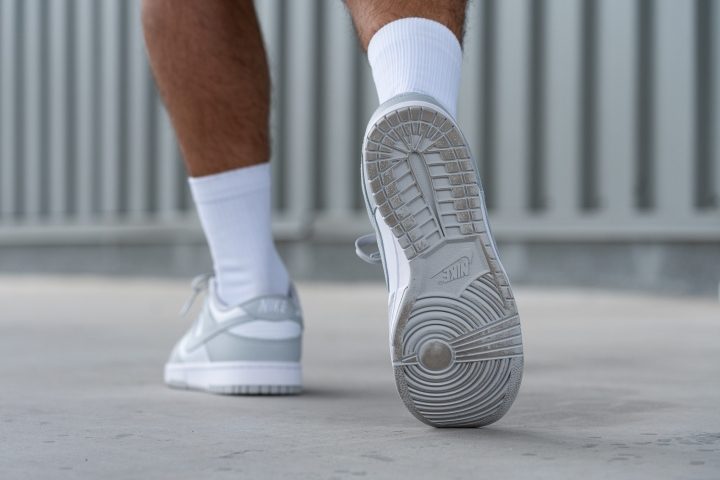
It even comes with the good old pivot point as a nod to the shoe's hooping past.
Size and fit
Internal length
We've got zero complaints about the Nike Dunk Low's sizing.
Getting the kick in our regular US men's size 9, it fits exactly as expected - true to size. In addition, we measured the internal length of the shoe at 268.9 mm which corresponds to the US 9 size in Nike's shoe size chart.
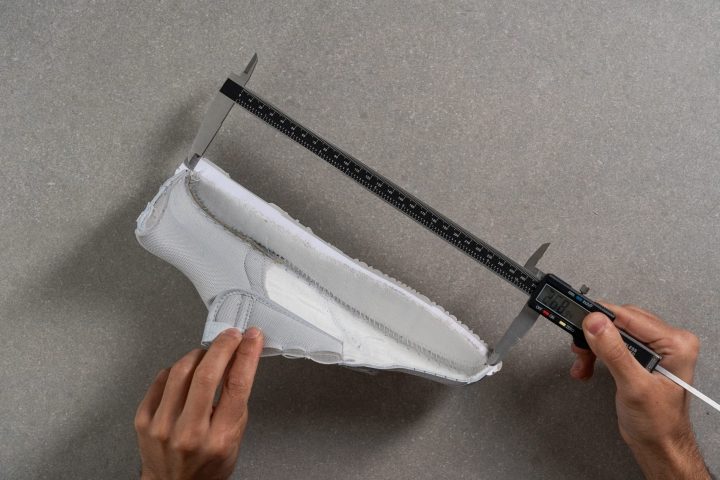
| Dunk Low | 268.9 mm |
| Average | 272.0 mm |
Toebox width at the widest part
The Dunk Low also offers an ample amount of space in the toebox.
Using a caliper, we measured the widest part of its forefoot at 100.2 mm. It is the normal, expected toebox width for an average sneaker.
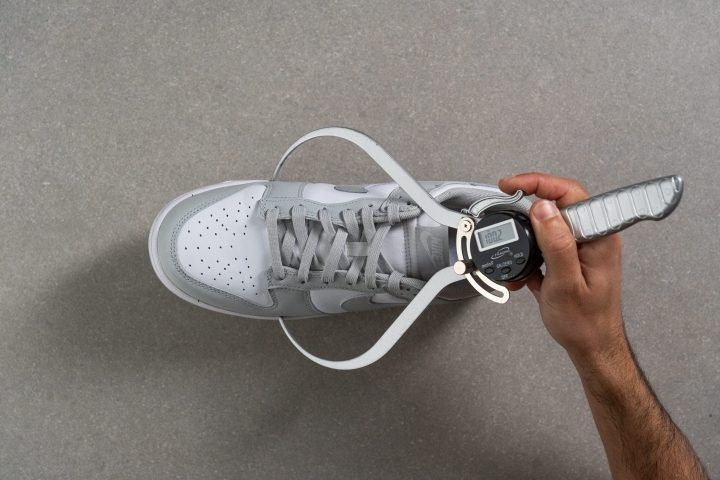
| Dunk Low | 100.2 mm |
| Average | 99.1 mm |
Toebox width at the big toe
We were also happy to find that the shoe's toebox doesn't taper much towards the front.
With a caliper measurement of 77.4 mm near the big toe, the shoe offers just enough toe space to feel comfortable and not cramped.
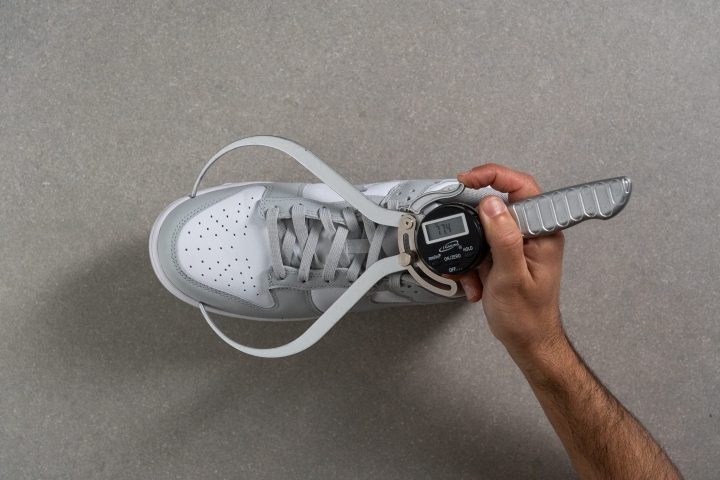
| Dunk Low | 77.4 mm |
| Average | 75.2 mm |
Tongue: gusset type
The Nike Dunk Low doesn't have any gussets on the sides of the tongue. But it's okay given the kick's retro appeal.
The good news is that the tongue doesn't slide as much anyways.
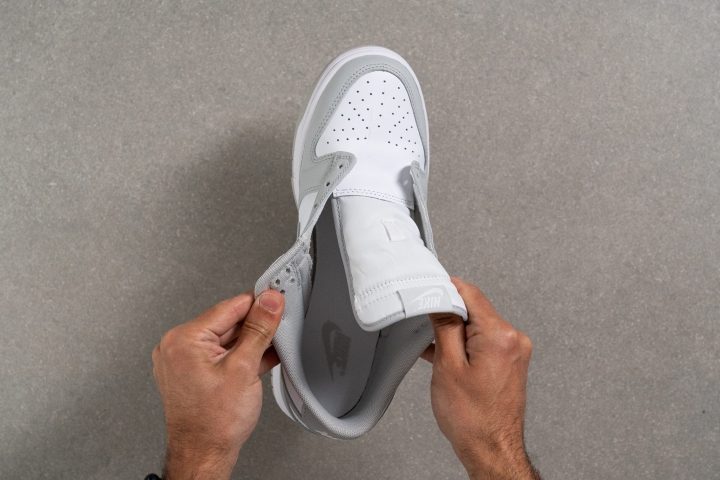
| Dunk Low | None |
Comfort
Tongue padding
The tongue of the Nike Dunk Low is very well-padded and is made puffier in the areas where it's most needed.
Using a caliper, we measured the thickest part of the tongue at 11.4 mm which is a bit thicker than average. Lace bites will never be a problem in this Nike kick.
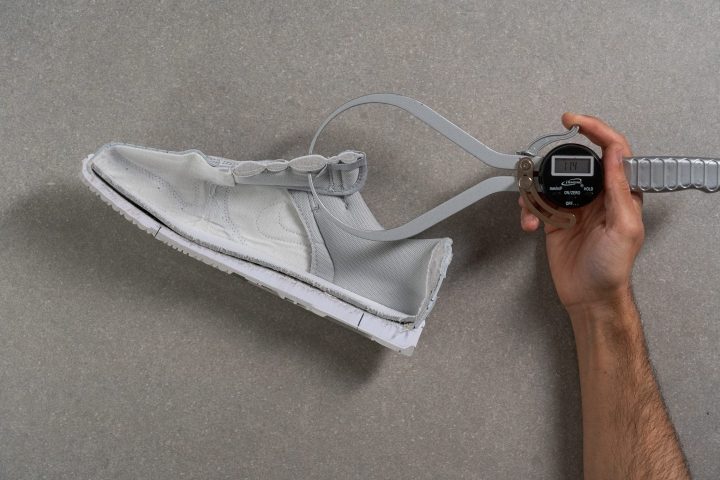
| Dunk Low | 11.4 mm |
| Average | 8.8 mm |
Heel tab
There are no pull tabs on the Dunk Low.
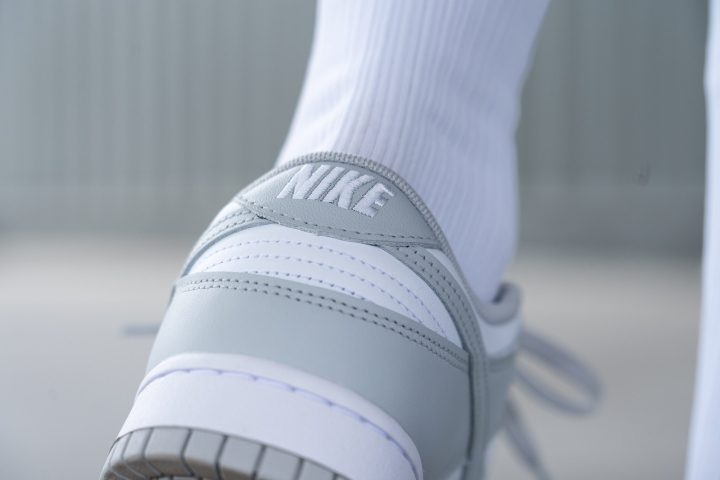
But we found it easy to slide in and out of the shoe thanks to its structured heel collar and easy-to-unlace setup.
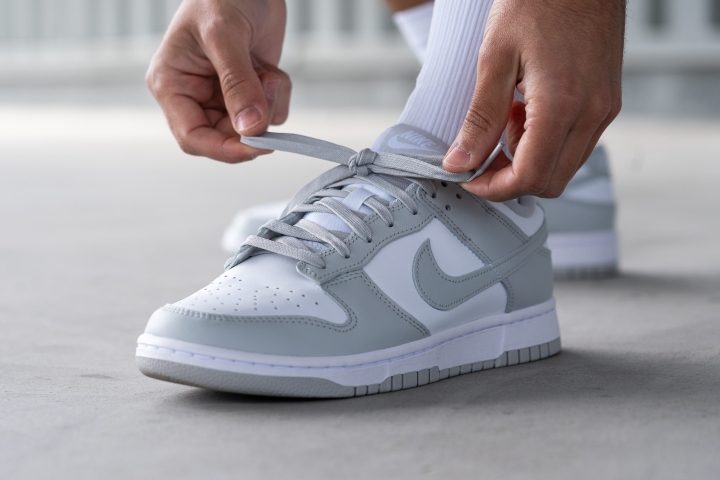
| Dunk Low | None |
Extra eyelets
We don't see this often in lifestyle sneakers, but the Nike Dunk Low features three additional pairs of eyelets for various lacing options.
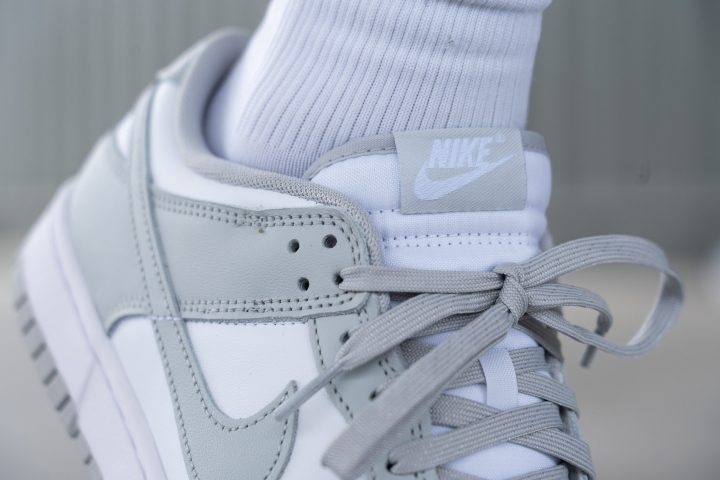
So, if you have narrow feet or prefer to get an extra secure lockdown, you can play around with different lacing patterns thanks to these added holes.
Removable insole
You can further customize the Dunk Low by replacing the insole. We found the stock one to be so plain and basic that it wouldn't be such a bad idea.
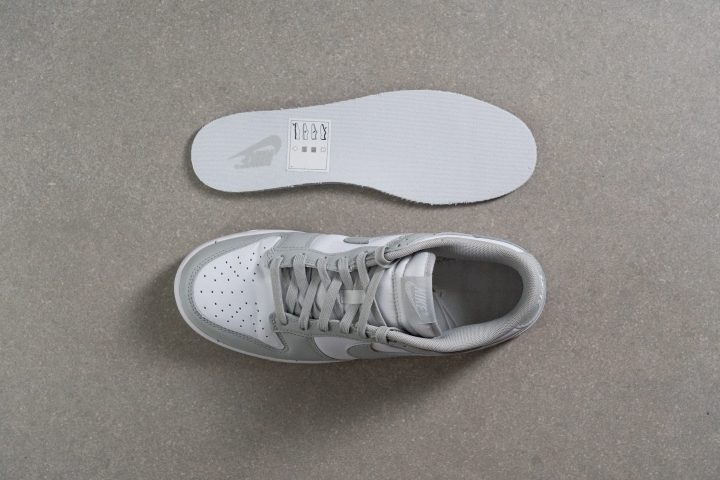
| Dunk Low | Yes |
Misc
Reflective elements
There are no reflective elements on the original Dunk Low model.
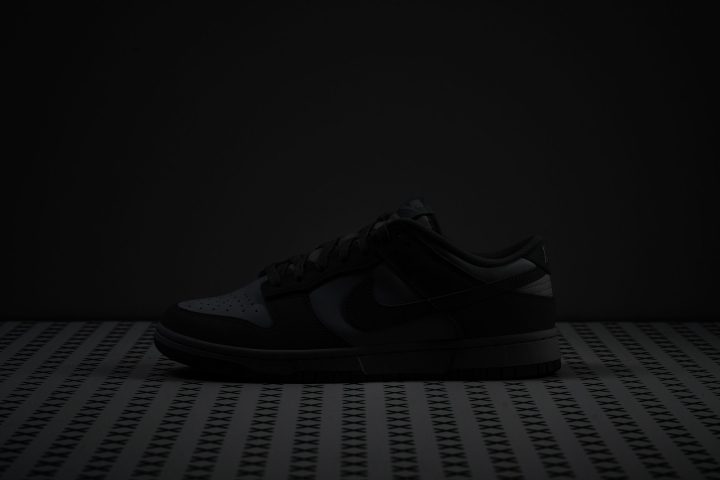
| Dunk Low | No |
Back to 1985
The Nike Dunk first came out as a high-top sneaker back in 1985.
It was brought to life by Peter Moore, an American designer famous for creating the Air Jordan 1 silhouette and the Jumpman logo.
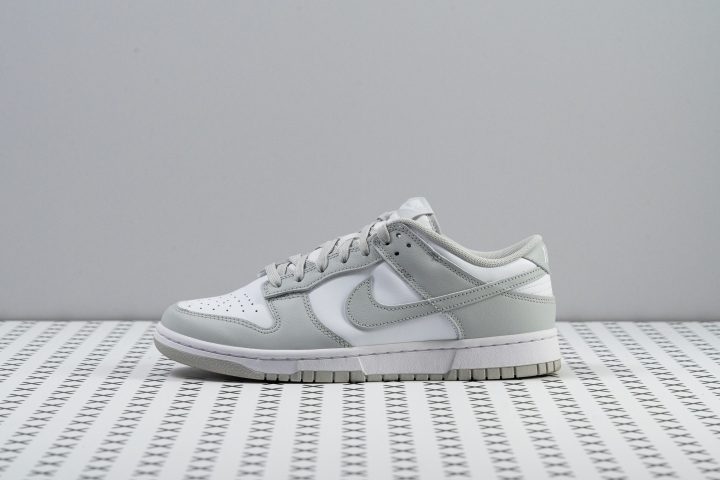
To design the basketball-inspired Nike Dunk High, Moore pulled cues from the Air Jordan 1, Air Force 1, and the Terminator - all highly popular hoop shoes at the time.
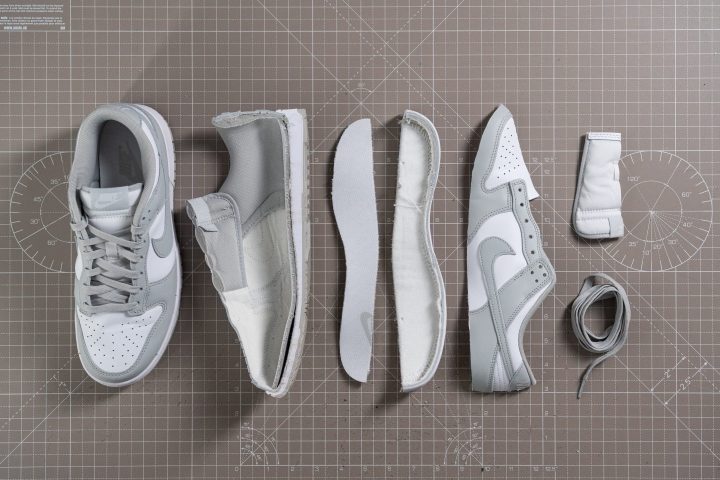
The Dunk quickly caught fire on the market partially due to its upper paneling which allows for numerous color-blocking options. This made the sneaker very appealing to college basketball teams and fans as they had the option to choose the color schemes of their schools.
